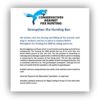There Can be no ‘Liberty to be Cruel’
Professor Geoffrey Scarre, Durham University
I personally think that hunting’s disgusting. But I suppose that people ought to be allowed to do it if they want to.I mean,we can’t just ban hunting because we don’t like it. If we banned everything that someone objected to,hardly anything would be permitted!
Quote from a Durham University student
Liberals believe in ‘live and let live’. But should they also believe in ‘live and let die’ when it comes to the controversial practice of hunting with dogs? As a teacher of moral and political philosophy, I’ve often heard people put the kind of argument that I’ve quoted above. It’s a characteristically liberal argument- or purports to be – and it appears to undercut the question of whether hunting is moral or immoral,humane or barbaric, a fine old tradition or an extreme form of bullying.For shouldn’t liberals, as my student suggested,put aside their own feelings about hunting and view the issue simply as one about the scope of civil liberties in a modern democratic state?
Yet we need to ask the question: What is the true scope of individual liberty in a modern democratic country like the UK, and does it entail a right to inflict gross suffering on animals in the name of ‘sport’? Do people have as much right to hunt and kill foxes,deer and hares as they do to attend football matches,watch television or play the jazz trumpet?
It’s worth asking here what the great Victorian apostle of liberalism, John Stuart Mill, would have made of this debate. Mill’s On Liberty (1859)1 is the most famous and influential defence of individual liberty in the English language, and most liberals and libertarians today still regard Mill as an inspirational figure. So it’s an interesting question what views Mill took on the treatment of animals and whether he would have seen the current legal ban on hunting as an affront to individual freedom. In fact, we don’t need to remain in the realm of speculation here, since Mill made his views on field sports quite explicit:he thought they were ‘wholly unjustified on a correct interpretation of liberal principles’.
The key to Mill’s position is the ‘one very simple principle’ that ‘the only purpose for which power can be rightfully exercised over any other member of a civilised community, against his will, is to prevent harm to others’ (Mill, 1869 Ch.1). Mill’s ‘harm principle’,as it has become known, rules out coercing people to act as other people think they should act, or would like them to act, except where their actions are liable to cause others harm. Much ink has been spilled on the extension of the term ‘harm’, but no one disputes that actions which kill, maim, damage the health of, impoverish or enslave others are patently harms. Admittedly, in the political tract On Liberty, Mill is concerned with the principle in relation to inter-human relationships and does not consider its bearing on animals. But elsewhere he does. In an early essay he termed it a ‘superstition of selfishness’ to suppose that the suffering of animals was of no ethical account. Because animals are sentient beings, they are capable of being harmed and therefore come within the protection zone of the harm principle. Consequently Mill thought that the state infringed no legitimate human liberty-rights when it forbade the mistreatment of animals. In a chapter on the ‘Limits of the Province of Government’ in the Principles of Political Economy of 1848, he put the case for animals robustly:
The reasons for legal intervention in favour of [mistreated] children, apply not less strongly to the case of these unfortunate slaves and victims of the most brutal part of mankind, the lower animals. It is by the grossest misunderstanding of the principles of liberty, that the infliction of exemplary punishment Hunting with Dogs: Past, Present but No Future on ruffianism practised towards these defenceless creatures has been treated as a meddling by government with things beyond its province.2
This passage pulls no punches; for Mill a proper respect for liberty informed by the harm principle should lead us not to tolerate ‘ruffianism’ towards animals but to place it under the ban of law. While Mill thought that all forms of cruelty to animals should be made illegal, his attitude specifically to huntingfor sport was made clear in a letter written to John Morley in 1869. Referring to an anti-field sports article published by the historian Edward Augustus Freeman, Mill wrote:
I cannot too much congratulate you on such a paper as that of Mr Freeman. I honour him for having broken ground against field sports, a thing I have often been tempted to do myself, but having so many unpopular causes already on my hands, thought it wiser not to provoke fresh hostility.
Killing or mistreating animals for sport, in Mill’s view, is unambiguously ruled out by the harm principle, justas killing or mistreating human beings for the sadistic pleasure it gives one would be. Therefore claims that it is a legitimate liberty of Englishmen are spurious.
Supporters of hunting loudly complain that the banning of their ‘sport’ is a gross violation of their rightful liberty to amuse themselves in their own way, which they claim harms no one else. Because they ascribe negligible moral status to the animals they pursue and kill so cruelly, they see the harm they cause to them as counting for nothing. John Stuart Mill, our greatest guru of individual liberty, saw things very differently. Rejecting as absurd the claim that harm to animals was morally insignificant, Mill was clear that the ‘one very simple principle’ extended to them too.
In short, there is no liberty-right to inflict harm on animals in the name of sport. To maintain the legal ban on hunting is therefore not an improper limitation of individual freedom by a state that sees itself in the role of Big Brother. It is, quite simply, the right thing to do.
Professor Geoffrey Scarre
Department of Philosophy, Durham University
August 2010
1 Mill, J. S. (1869) On Liberty. London: Longman, Roberts & Green
2 Mill, J. S. (1848) Limits of the Province of Government In: Ashley W. J, ed. (1909) Principles of Political Economy with some of their Applications to Social Philosophy. 7th ed. London: Longmans, Green and Co.






